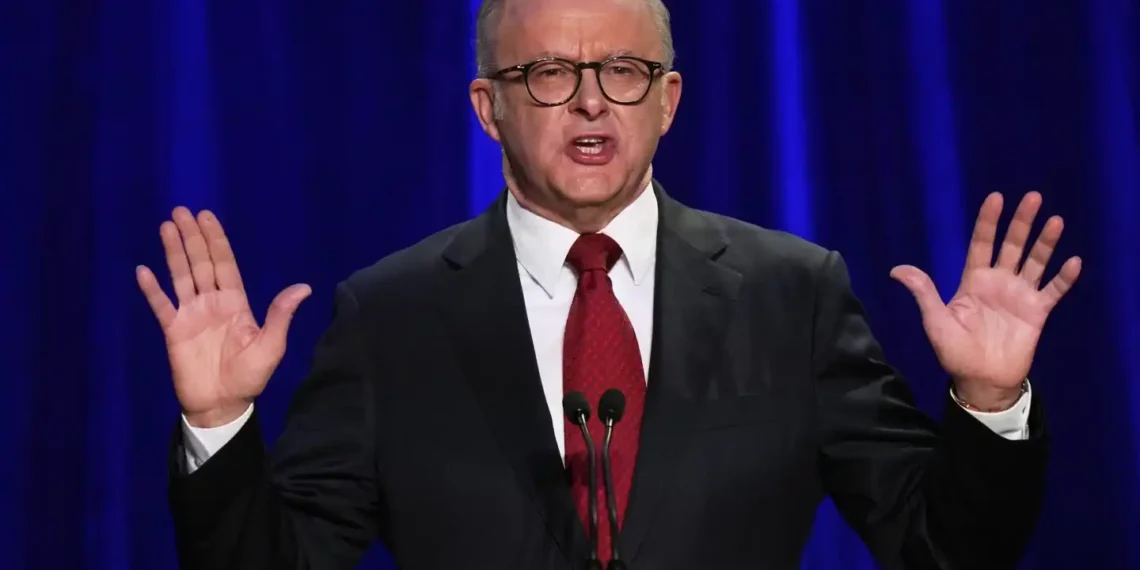Australian Prime Minister Anthony Albanese Secures Second Term, Rejects Trump-Like Politics
MELBOURNE, Australia — In a historic victory, Australian Prime Minister Anthony Albanese has clinched a second consecutive term, making him the first leader in 21 years to secure this achievement. His victory speech in Sydney marked the momentous occasion, where he highlighted his government’s approach to global challenges, distinct from U.S. President Donald Trump’s style.
“We face challenges the Australian way — by looking after each other while building for the future,” Albanese told supporters, reinforcing his commitment to a unique path for the country. “We don’t seek inspiration from abroad; it comes from our values and our people.”
Albanese’s center-left Labor Party had drawn sharp contrasts with his opponent, Peter Dutton, calling him “DOGE-y Dutton” and accusing his conservative Liberal Party of mimicking Trump’s policies. Dutton, who had held his parliamentary seat for 24 years, conceded defeat after the election and acknowledged his loss.
In a parallel to Canada’s Pierre Poilievre, who lost his seat after Trump’s tariff policies hit Canada, Dutton’s failure suggests the influence of Trump’s approach on global politics has waned. Analysts argue that aligning with Trump became a liability for conservative candidates, especially after his global tariffs.
Despite the efforts of minor party Trump-inspired movements, like the Trumpet of Patriots, which garnered just 2% of the vote, Albanese’s win is seen as a strong endorsement of his policies, with the country rejecting the divisive rhetoric associated with Trump.
International Reactions to Albanese’s Victory
U.S. Secretary of State Marco Rubio congratulated Albanese on his second term, emphasizing the strong partnership between Australia and the United States. “Our shared democratic values are the foundation of our enduring alliance,” Rubio said. He expressed optimism about deepening collaboration on global issues.
Similarly, British Prime Minister Keir Starmer, a fellow center-left leader, congratulated Albanese, noting that Australia and the UK continue to strengthen their ties. “We will continue working on shared ambitions, including trade and energy, to improve the lives of working people,” Starmer remarked.
Labor Party Surpasses Expectations
The Labor Party, which held a narrow majority of 78 seats in the 151-seat House of Representatives, is now poised to increase its standing. Australian governments traditionally lose seats in their second term, but Labor has defied this trend, marking a significant political shift.
This victory comes amid rising concerns about cost of living and inflation, which dominated the campaign. Both parties recognized the country’s financial challenges, but their solutions differed sharply. While the Liberal Party blamed government overspending for the inflation spike, Labor focused on tackling economic issues while maintaining essential services.
Energy and Inflation: Key Election Issues
Energy policy and inflation were central to the election debates. Dutton’s push for nuclear power to reduce energy costs stood in stark contrast to Labor’s emphasis on renewable energy sources like solar and wind. Albanese’s government rejected the idea of relying on nuclear energy, proposing instead a more sustainable path to achieving net-zero emissions by 2050.
Opposition senator Jacinta Nampijnpa Price, who had proposed cutting 41,000 public service jobs under Dutton’s leadership, attracted attention when she echoed Trump’s “Make America Great Again” slogan. She later dismissed comparisons to Trump, criticizing the media for making the election about Trump’s influence rather than Australian governance.
The Economic Struggles of Everyday Australians
The election unfolded amid a growing cost of living crisis. According to Foodbank Australia, 3.4 million households faced food insecurity last year, with many Australians skipping meals or struggling to afford food. The central bank’s recent interest rate cut signaled that the worst may be over, but the ongoing financial hardship remains a key concern.
Looking Ahead
With Albanese’s re-election, Australians are looking toward a future shaped by stability, progressive policies, and a distinctively Australian approach to global challenges. As the country moves forward, the question remains: Can Albanese’s government continue to navigate the difficult economic landscape without following the divisive rhetoric of global figures like Trump?
The next few years will be crucial as the Albanese government strives to balance economic recovery, climate action, and social equity in an increasingly interconnected world.
This article was rewritten by JournosNews.com based on verified reporting from trusted sources. The content has been independently reviewed, fact-checked, and edited for accuracy, neutrality, tone, and global readability in accordance with Google News and AdSense standards.
All opinions, quotes, or statements from contributors, experts, or sourced organizations do not necessarily reflect the views of JournosNews.com. JournosNews.com maintains full editorial independence from any external funders, sponsors, or organizations.
Stay informed with JournosNews.com — your trusted source for verified global reporting and in-depth analysis. Follow us on Google News, BlueSky, and X for real-time updates.














